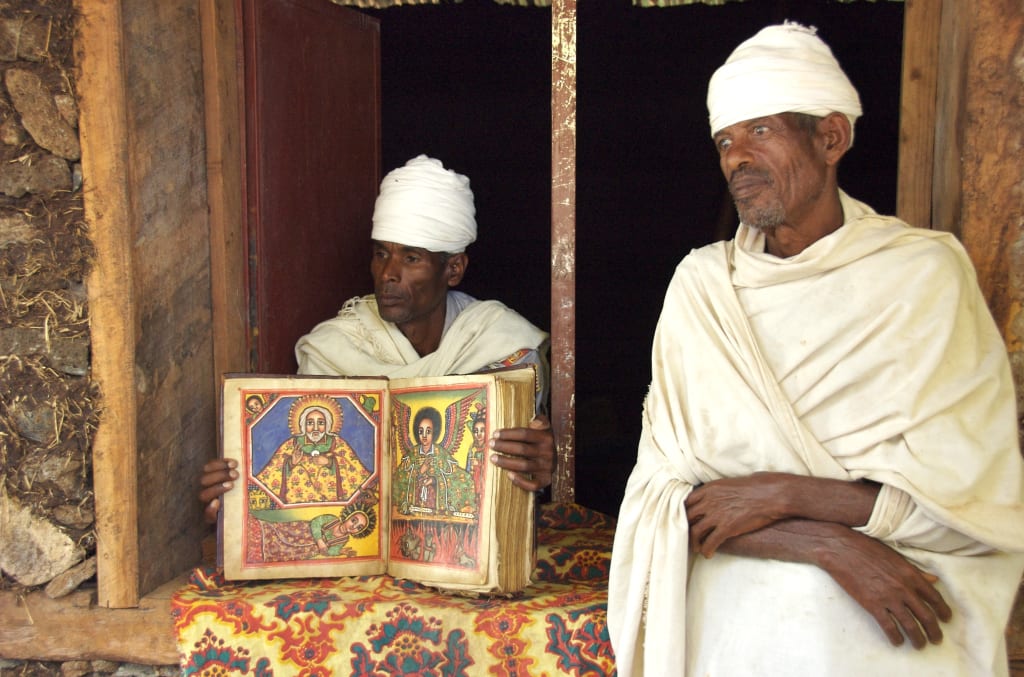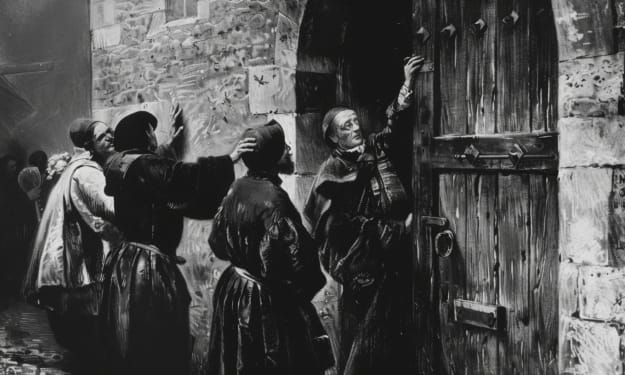Bring Back the Maccabee Version
an essay on traditional Christianity

Max Romeo, the reggae artist, released a song in 1976 titled “Maccabee Version”. I remember hearing it as a boy in Jamaica. At some point, I became aware of something the Rastafarians called the “Maccabee version” of the Bible. They believed the Bible had been altered and the Maccabee was an older, more correct version. That's what Romeo's song was about. It implored people to "bring back Maccabee version".
Another thing that seemed important to some of those who wanted to “bring back Maccabee version” was the Book of Psalms. It had been changed, as well. In its earlier form, it contained 151 Psalms, rather than the 150 present in many modern Bibles.
What is the deal with this Maccabee version, with its 151 Psalms? Well, it is an earlier form of the Bible, containing the Books of Maccabee, as well as other allegedly extra books.
Over time, I grew more knowledgeable on the subject, not only from greater insight into Rastafarian beliefs but also from a deeper study of Christianity. The Rastas didn’t just make this stuff up.
Before I go on, let me be clear, Rastafarianism is a separate religion from Christianity, although it does borrow extensively from Judeo-Christian tradition. As an Orthodox Christian, I do not accept, or endorse, Rastafarianism. Having said that, the issue of the Maccabee version of the Bible is one of several instances where the early Rastafarians identified a problem with the varieties of Christianity to which they were exposed.
It is possible to know something is incorrect, without understanding what the correct answer might be. I believe that to be the case in this instance. It was the case with me for many years. Something was amiss, but what?
The original King James Version of 1611 contained a section of books, often called the Apocrypha. This section included not only 1 Maccabees and 2 Maccabees, but thirteen other books, such as Tobit, 1st and 2nd Esdras, Baruch, the Prayer of Manasseh, and more. This section was placed between the Old and New Testaments and considered to be spiritually profitable, but not on equal footing with the Holy Scriptures.
This Apocrypha was part of the King James Version for 274 years. It was not removed until 1885. The King James Version of the Bible most of us now know came about in its current form less than 150 years ago. The Rastas who knew this wondered why. Why would anyone change the Bible?
They came to their conclusions about that, which is beyond the scope of this discussion and the beliefs of the Rastas are for them, not me, to defend. However, our interests do converge at the point of the question itself. Why would anyone change the Bible?
It is a historical fact Protestants changed the biblical canon. Throughout my life, I have encountered and confronted some of the same questions the Rastafarians addressed within their belief system. I would say, to some extent, their belief system developed from the asking and answering of such questions. I would contend, though, they did not dig deep enough, or allow the ancient Christian Church to speak for itself in answering such questions.
What the Rastas perceived as problematic with the altering of the Bible is part of a larger issue with deeper roots than the removal of the Apocrypha from the King James Version. The fact is the version of the Bible most modern Protestants use is not the version historically used by the Church. When I say version here, I don’t mean one translation versus another. I mean the version of the Bible many people own and are familiar with is not organized in the same manner as the traditional Christian scriptures. In reality, it is missing more than the fifteen books purged from the so-called Apocrypha of the King James Version.
You see, even the original King James Version was an altered form of the Holy Bible. When the Rastas urge others to use the Maccabee version, the version they are appealing to for authority, is itself lacking.
The Protestant Reformation, with its now countless innovations and novelties, was responsible for rejecting several books from the accepted canon of Holy Scriptures since the early days of the Christian Church.
So, early Protestant versions of the Bible resulted from rejecting books of the Old Testament. That includes those containing a so-called Apocryphal section of what they considered some sort of quasi-scripture. Protestants rejected the Old Testament as it had always been accepted by the Church.
During the New Testament era, the time of the earthly ministry of Jesus Christ and of His original Apostles, the most prevalent translation of the Old Testament scriptures used by the Jews was a version called the Greek Septuagint.
Although there had been previous versions in Hebrew, the oldest existing version of the Old Testament scriptures remaining is the Septuagint. The Septuagint version of scriptures was translated into Koine Greek beginning in the 3rd Century BC and completed around 132 BC, well over a century before the birth of Christ.
The Hebrew translation from which they sourced the Septuagint has long since been lost to us, leaving the Greek Septuagint as the oldest surviving version. The Septuagint served as the basis for later translations into the regional and local languages of the earliest Christian communities, including Old Latin, Slavonic, Armenian, Georgian, and Coptic.
Protestants to the present day have continued to reject the traditional canon of Old Testament scriptures. Indeed, have only cut out more books over the years. Even the lingering acceptance of the so-called Apocrypha, for a time, among Protestants was a departure from traditional Christianity.
In the history of the ancient Christian Church, this concept of an Apocrypha was alien. These books, such as the Maccabees, are simply part of the Old Testament. They do not stand apart from it. They are not a separate body of work.
When scriptures are quoted within the New Testament, it is most often the Greek Septuagint version the writers use. For the Jewish community of that era, it was the oldest available at the time and widely considered the most reliable. As the Gospel of Christ spread the Septuagint served as the standard of the Church.
Aside from the translation itself, it bears noting the books included in the Septuagint represented the accepted canon of scriptures within Judaism in those days. It was not until the 7th Century AD, several centuries after the establishment of Christianity, that the Hebrew Masoretic Text came about. That is when the smaller Old Testament canon came into wide use within Judaism.
The Christian Church, however, continued to use the Septuagint as its scriptural standard for the Old Testament and never altered the number of books contained in the Old Testament. Only in the time of Martin Luther and the Protestant Reformation was it decided to use the Masoretic as the standard for the Old Testament and, then, only the Protestants who chose to do so.
Of course, the Reformers had a general desire to reject anything perceived as a Roman Catholic tradition. There was also a mistaken notion that because the Masoretic Text was in Hebrew it was inherently more reliable. Whether this stemmed from a genuine ignorance of the truth, or a willful disregard of the truth to serve their theological agenda, the Reformers used faulty logic to alter the scriptures.
Little did I know when, as a boy, I heard Max Romeo singing “Maccabee Version” one day I would, indeed, be using the Maccabee version. As an Orthodox Christian, I read the original Maccabee version. It is the Septuagint.
As the Rastafarians had, I arrived at a point where I could not accept the inconsistencies and contradictions present in the Christian sects confronting me. It became clear certain things accepted by those around me had not always been believed by Christians, or been accepted by the Church.
The very Bible used by everyone I knew was demonstrably not the same one used by the ancient and early Christians. What I learned was that the faith of the New Testament did not disappear. The scriptures and texts they used have not vanished, either.
Yes, I agree, for those who have relinquished it, bring back the Maccabee version. Do so in its original form. With it, bring back the unaltered and undiluted form of Christianity that exists, in a continuum, from the day of Pentecost until now.
Remember the "Faith of our Fathers". The “faith which was once delivered to the saints”. Jesus Christ promised the “gates of hell would not prevail against” and they have not. The same Church still exists, as do the scriptures that have always formed part of its tradition. It is not lost. So, yes, you can bring it back if you have either forgotten or forsaken it.
---------------------------------------------------------------------------------------
"Maccabee Version" by Max Romeo
About the Creator
Randy Baker
Poet, author, essayist.
Reader insights
Outstanding
Excellent work. Looking forward to reading more!
Top insights
Compelling and original writing
Creative use of language & vocab
Easy to read and follow
Well-structured & engaging content
Excellent storytelling
Original narrative & well developed characters
Expert insights and opinions
Arguments were carefully researched and presented
Eye opening
Niche topic & fresh perspectives
Heartfelt and relatable
The story invoked strong personal emotions
Masterful proofreading
Zero grammar & spelling mistakes
On-point and relevant
Writing reflected the title & theme






Comments (4)
This was extremely educational, Randy, with a lot of food for thought.
Good intro to get people thinking, Randy
Great treatise!
Wow, Randy!! This was so in-depth and insightful. I loved reading about your personal reflections and experiences. It is incredible to read about how one song can send out so many ripples of curiosity, discovery, and inspiration. Thank you so much for writing and sharing this piece!